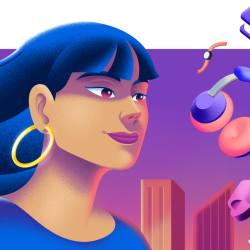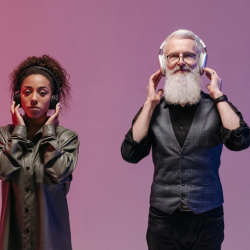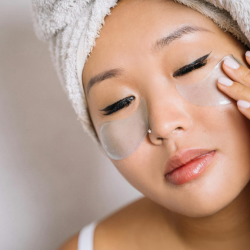As it stands, the digital world is a paradox. It seems we’re divided into two distinct camps — being its biggest champions, or your personal grievances with the online world being ignored completely. Innovation remains largely gate-kept by those at the top, and increasingly whether we are allowed to thrive online depends on the daily mood swings and impulses of tech bros. But tech for good entrepreneurs are changing that, redefining innovation in the process, which is all the more urgent in a world where digital technology is happening to us, rather than being built with us, for us.
To block or not to block?
As an intern at Facebook in 2008 who went on to become a Silicon Valley engineer, Tracy Chou had historically been a tech champion. She echoed the utopian visions of Zuckerberg’s pledge to ‘connect the world’. But when she fell victim to the costs of the public by default mode of digital living that social media centres, she realised there was a darker cost.
After being targeted by stalkers and sabotaged by online trolls, she realised the ‘social’ in social media was creating new risks of harm. She decided to launch Block Party, a desktop browser extension that allows you to check your settings on platforms and tighten your privacy in a matter of clicks. User safety and privacy can seem complicated when we’ve been conditioned to skim and accept T&Cs in a blink of an eye, but it’s becoming all the more important. The United Nations estimates that 95% of all online abuse is directed towards women. Deepfake technology is exacerbating this trend, with over 90% of deepfakes being non-consensual porn of women. Whilst Big Tech is slow to provide safeguards and prioritise safety by design, Block Party have made it their number one priority.
Locked out and left behind
The digital world and the immense opportunities it brings can provide but only if you’re a part of it. Imagine leaving prison before social media existed, and re-entering a society where it is expected that you can just ping over a CV or purchase a digital train ticket. Undoubtedly, you’d feel completely left behind at a vital transition period in your life, and admittedly, it’s a barrier I had never considered until I met James Tweed. Tweed is the founder of King’s Award-winning company Coracle, which provides inmates at 90 prisons across England and Wales with access to secure laptops in their cells.
‘Digital exclusion can have a terrible impact on mental wellbeing, health, and opportunities. On the flip side, when someone does learn basic skills, their whole outlook can be transformed and everyone in society benefits.’
The annual cost of reoffending to the UK is estimated at £18.1 billion, and at a time when 90% of jobs are only advertised online, digital inclusion can mean the difference between a new future, or turning back to crime.
In 2021, The Ministry of Justice set out a Prisons Strategy White Paper, which aimed for the prison system to be ‘digitally enabled for prisoners and staff, by default’ but gaps persist. One of the few companies permitted by the Ministry of Justice, Coracle provides access to digital devices that are creating transformative benefits for prisoner wellbeing and prospects.
‘Coracle laptops are one of the very few things a prisoner can legitimately exercise control over — moving a cursor around and using the keys to type notes provides freedom of choice. In life, we all need to have something meaningful to do.’ Digital skills allow people to feel a sense of agency over their lives. ‘Digital skills translate into providing hope for prisoners, which has a visible impact on their mental health, willingness to engage and ability to start imagining a future that is different to their past,’ Tweed tells MediaCat Magazine. Whilst the UK imagines itself as a technology superpower, as it stands, vast swathes of the population are being left to fend for themselves, but Coracle makes it known that prisoners must be equipped to live digital lives like the rest of us.
Digital lives: thriving or surviving?
Whilst the go-to catchphrase for parents was previously ‘don’t talk to strangers’, in the digital age, this hasn’t stood the test of time. We no longer need to step outside to be at risk of danger, and the vast nature of social media has left harms to unravel at impossible speed. New research by online safety experts Verifymy have found that three-quarters of UK parents say their kids have experienced online harm, from illicit content to harassment. And it isn’t just children — adults too can become vulnerable to the impacts of consuming harmful content, or being exposed to insidious actors, because what goes on in our digital lives is just as impactful as what happens outside of it.
After losing her 21-year-old brother Josh to suicide, Alice Hendy became suddenly aware of the realities of a vastly under-regulated digital world, where the safeguards we have offline are flagging to keep up. This moment of realisation came after Josh’s death, when we looked through his iPad and saw that he had been searching for harmful content online. Consumed by grief but determined to prevent future deaths from online harm, Alice decided to found R;pple. A secure and confidential interceptive tool designed to help vulnerable people when they need support most, the tool directs them towards vital mental health support, and away from content that puts them at risk of danger.
At a time when there are 1.2 million searches globally for ways to take your own life each month, R;pple has offered an urgent intervention to tackle the mental health crisis so many are facing. Already, 24 individuals have come to Alice to say they’re still here because of R;pple’s intervention, revealing the transformative power of technology that is designed with the core value of empowering people’s lives, rather than profit.
Featured image: Tracy Chou, taken by Helena Price for the Techies Project

































